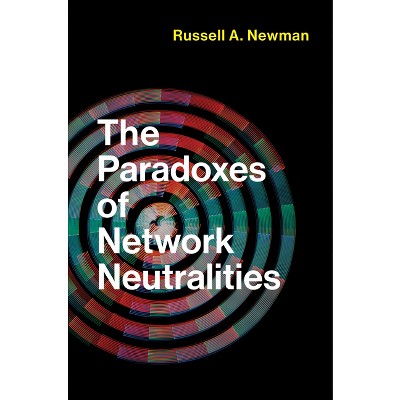Sponsored

Antitrust Policy and Interest-Group Politics - (New Directions in Information) by William F Shughart (Hardcover)
In Stock
Sponsored
About this item
Highlights
- This groundbreaking study is the first to apply an analytical model derived from the interest-group theory of regulation to the study of antitrust law and policy.
- About the Author: WILLIAM F. SHUGHART II is Professor of Economics and holder of the P.M.B Self, William King Self, and Henry C. Self Chair in Free Enterprise at the University of Mississippi.
- 232 Pages
- Business + Money Management, Government & Business
- Series Name: New Directions in Information
Description
About the Book
This groundbreaking study is the first to apply an analytical model derived from the interest-group theory of regulation to the study of antitrust law and policy. The application of this model which stresses that government intervention in the economy will always benefit some political groups at the expense of others to the analysis of antitrust enables Shughart both to identify important trends in the antitrust arena and demonstrate which groups have benefited most from antitrust legislation. His analysis clearly shows that consumer welfare is often not enhanced by antitrust suits or legislation. Rather, well-organized private interest groups have tended to benefit more, even in cases where consumer welfare is the stated goal of legislation or policy.
Divided into three sections, the volume begins by discussing normative and positive theories of antitrust. The author provides an overview of the origins of antitrust law and policy and introduces the interest-group theory of government. The second section explores the various private interests that impinge on antitrust policy: the business community, the antitrust bureaucracy, Congress, the judiciary, and the antitrust bar. Finally, Shughart examines the political economy of antitrust. He shows how antitrust can be used to subvert competition and offers suggestions for reform in the realm of interest group politics. Students of economics and business, as well as professional economists, corporate lawyers, legislators, and business consultants, will find important new insights into the direction taken by antitrust policy during the last few decades.
Book Synopsis
This groundbreaking study is the first to apply an analytical model derived from the interest-group theory of regulation to the study of antitrust law and policy. The application of this model which stresses that government intervention in the economy will always benefit some political groups at the expense of others to the analysis of antitrust enables Shughart both to identify important trends in the antitrust arena and demonstrate which groups have benefited most from antitrust legislation. His analysis clearly shows that consumer welfare is often not enhanced by antitrust suits or legislation. Rather, well-organized private interest groups have tended to benefit more, even in cases where consumer welfare is the stated goal of legislation or policy.
Divided into three sections, the volume begins by discussing normative and positive theories of antitrust. The author provides an overview of the origins of antitrust law and policy and introduces the interest-group theory of government. The second section explores the various private interests that impinge on antitrust policy: the business community, the antitrust bureaucracy, Congress, the judiciary, and the antitrust bar. Finally, Shughart examines the political economy of antitrust. He shows how antitrust can be used to subvert competition and offers suggestions for reform in the realm of interest group politics. Students of economics and business, as well as professional economists, corporate lawyers, legislators, and business consultants, will find important new insights into the direction taken by antitrust policy during the last few decades.Review Quotes
"Shughart (formerly an economist at the Federal Trade Commission; currently the occupant of a chair in free enterprise at the University of Mississippi) discusses the motivations--the political economy--of antitrust. He approaches antitrust policy as an example of influences brought by special interest groups seeking their own ends, rather than the public interest' however defined. This volume thus becomes another study supporting the interest group theory [or the capture theory] of [ecomomic] regulation.' The pressure groups are business firms, the antitrust bureaucracy, the Congress, the judiciary, and the private antitrust bar (each receiving a chapter). Shughart argues that these groups use antitrust to subvert rather than support the competitive process;income is redistributed (what the interest groups want) while resource allocation is likely to be made worse. This is an interesting and important book, but its argument will not be likely to convince many observers that other motivations and goals play no part in antitrust policy. Aimed at professional bureaucrats as well as undergraduates in political science and economics."-Choice
?Shughart (formerly an economist at the Federal Trade Commission; currently the occupant of a chair in free enterprise at the University of Mississippi) discusses the motivations--the political economy--of antitrust. He approaches antitrust policy as an example of influences brought by special interest groups seeking their own ends, rather than the public interest' however defined. This volume thus becomes another study supporting the interest group theory [or the capture theory] of [ecomomic] regulation.' The pressure groups are business firms, the antitrust bureaucracy, the Congress, the judiciary, and the private antitrust bar (each receiving a chapter). Shughart argues that these groups use antitrust to subvert rather than support the competitive process;income is redistributed (what the interest groups want) while resource allocation is likely to be made worse. This is an interesting and important book, but its argument will not be likely to convince many observers that other motivations and goals play no part in antitrust policy. Aimed at professional bureaucrats as well as undergraduates in political science and economics.?-Choice
?The author's study applies an analytical model derived from the interest-group theory of regulation to the study of antitrust law and policy. He concludes that consumer welfare is often not enhanced by antitrust suits or legislation; rather, well-organized private interest groups have tended to benefit more, even in cases where consumer welfare is the stated goal of legislation or policy.?-Legal Information Alert
?This book does an excellent job of applying the tools of the economic analysis of interest groups and of public choice to antitrust. . . . At the very least, those who read this book will come away with a better understanding of how antitrust laws function and what motivates certain cases.?-Regulation
"The author's study applies an analytical model derived from the interest-group theory of regulation to the study of antitrust law and policy. He concludes that consumer welfare is often not enhanced by antitrust suits or legislation; rather, well-organized private interest groups have tended to benefit more, even in cases where consumer welfare is the stated goal of legislation or policy."-Legal Information Alert
"This book does an excellent job of applying the tools of the economic analysis of interest groups and of public choice to antitrust. . . . At the very least, those who read this book will come away with a better understanding of how antitrust laws function and what motivates certain cases."-Regulation
About the Author
WILLIAM F. SHUGHART II is Professor of Economics and holder of the P.M.B Self, William King Self, and Henry C. Self Chair in Free Enterprise at the University of Mississippi. He is a former special assistant to the director of the Federal Trade Commission's Bureau of Economics. He has published over 60 articles and book chapters in the areas of antitrust policy, industrial organization, and public choice. His most recent book is The Organization of Industry.Shipping details
Return details
Trending Non-Fiction











